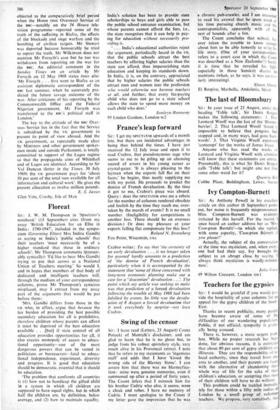Floreat
Sir : J. W. M. Thompson in 'Spectator's notebook' (13 September) cites (from my essay 'British Education for an Elite in India : 1780-1947', included in the sympo- sium Governing Elites) Mrs Indira Gandhi as saying re India's 'public schools' that their teachers 'must necessarily be of a higher standard that those in ordinary schools'. Mr Thompson comments (presum- ably cynically): Td. like to hear Mrs Gandhi trying to put that across at a National Union of Teachers meeting.' So would I, and in hopes that members of that body of dedicated and intelligent teachers will, through the medium of your correspondence columns, prove Mr Thompson's cynicism misplaced, may I extract from my essay part of the arguments that would be put before them : `Mrs. Gandhi differs from those in the Inc who, in effect, argue that because the tax burden of providing the best possible secondary education for all is prohibitive, therefore children whose parents can afford it must be deprived of the best education available . . .[but] if state control of all education provides opportunities for all, it also creates monopoly of access to educa- tional opportunity—one of the most dangerous powers that can be vested in politicians or bureaucrats—fatal to educa- tional independence, experiment, diversity and progress. It is good that education should be democratic, essential that it should be education.
`The problem that confronts all countries is (1) how not to handicap the gifted child in a system in which all children are supposed to have equal rights, but in which half the children are, by definition, below average, and (2) how to maintain equality. India's solution has been to provide state scholarships to boys and girls able to pass the public school entrance examination, but whose parents cannot afford the fees, i.e., the state recognises that it can help in pay- ing for education without necessarily pro- viding it.
. . . India's educational authorities reject the argument, periodically heard in the UK, that the public schools attract the best teachers by offering higher salaries than the state can afford, thus impoverishing state education and keeping its standards down. In India, it is, on the contrary, appreciated that by higher salaries the public schools attract men and women into the profession who would otherwise not become teachers at all, and further, that every fee-paying child who does not go to a state school allows the state to spend more money on each child who does.'








































 Previous page
Previous page